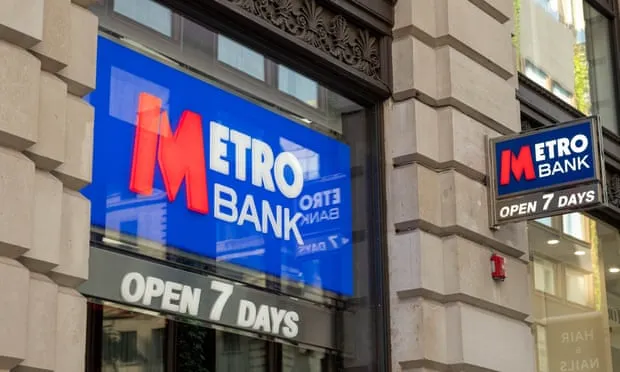Metro Bank is launching a fresh cost-cutting drive after the embattled lender clinched a £925m rescue package from investors over the weekend.
The high street lender said it was aiming to slash about £30m of costs a year from 2025 as part of the deal, which avoided a potential breakup or takeover by a rival UK bank.
It was not immediately clear whether those cuts will result in job losses among its 4,000 employees, including those that work across its 76 branches. Metro Bank declined to comment.
Metro, which became the UK’s first new high street lender in 150 years when it burst on to the scene in 2010, also confirmed overnight that customers had started to pull their money out in recent days amid worries over its financial health.
In total, the rescue deal involves £600m of debt refinancing, on top of a £325m capital raise, which includes £150m of new shares sold at 30p a share. It is also planning to sell off about 40% – or £3bn – of its mortgages to reduce the risks on its balance sheet.
Shares jumped 17% on Monday morning to 53p a share, after news of the financing package over the weekend, which helped it avoid an emergency takeover by a rival UK bank.
Metro, which was co-founded by the US billionaire Vernon Hill, will come under the control of another wealthy businessman: the Colombian billionaire Jaime Gilinski Bacal. Bacal’s investment vehicle, Spaldy, offered the bank £102m to boost his stake from 9% to 53% as part of the deal.
The Metro Bank chief executive, Dan Frumkin, will also plough up to £2m into the lender as part of the rescue deal, a sum that surpasses his £1.3m total pay package for 2022. The chief financial officer, James Hopkinson is also poised to buy up to £60,000-worth of shares.
Over the weekend, the Bank of England had deployed EY to sound out big lenders, including NatWest and JP Morgan, about potentially buying the whole of Metro Bank. HSBC, Santander UK and Lloyds were also reportedly approached for a potential sale.
While some of the lenders are still considering buying Metro’s mortgage book, most ruled out a full-scale takeover. Some said this was due to the additional capital needed to shore up its finances, while others were wary about taking on its costly branch network.



